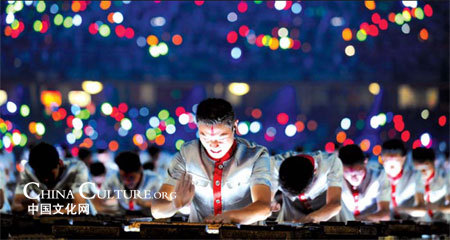| ||||||||||||||||||||||||||||||||||||||||||||||||||||||||||||||||||
The Olympic Opening Ceremony was a unique opportunity to introduce Chinese culture to the rest of the world. Furthermore, a vital element of the ceremony was its music, which featured many traditional Chinese instruments. Chen Leiji, 41, was one of many musicians at the ceremony but he attracted greater attention because of the instrument he played immediately after the flag-raising ceremony. Guqin, a seven-stringed zither-like instrument, has been regarded as the epitome1 of Chinese music, philosophy and culture for 3,000 years. Born into a musician's family in Shanghai, Chen began learning guqin at age 9 and studied with master Gong Yi at the Shanghai Conservatory2 of Music before leaving for France in 1989 to study piano, composition and conducting. His four-year trip to Europe not only provided him extensive experience with dozens of orchestras but also deepened his understanding of the Chinese music tradition. "After learning Western music, which is very strict, I came to love the freedom of guqin," says Chen. While the score in guqin music records the position and gesture of the hands, the rhythm is not dictated3. As a result, says Chen, "each player can have his or her own understanding of the same piece". Symbolism runs deep in guqin music reflecting its supreme4 ability to put man in touch with nature. Its strings5, for instance, symbolize6 gold, wood, water, fire and earth - five basic elements of the universe. Emperors Wenwang and Wuwang, who founded the Zhou Dynasty in the 11th century BC, added two more strings to the instrument, which signifies the grave nature of this instrument. Ancient Chinese scholars regarded playing guqin with a few friends in the pine forest or bamboo grove7 as one of life's greatest pursuits. It was also popular for the guqin player to chant or sing poems. At the Opening Ceremony, Chen played guqin with many other instruments for specially-written musical scores. These other instruments carry equally profound meanings in Chinese culture. One of them was fou, a pottery8 wine container that can be struck with a stick to produce a musical sound. The Book of History written by Sima Qian (145-c.90 BC), said that when the Dukes of Qin and Zhao met in Mianchi (in today's Henan province) in 279 BC, the Duke of Qin pretended to be drunk and asked his counterpart to play se (a stringed instrument). 点击  收听单词发音 收听单词发音
|
||||||||||||||||||||||||||||||||||||||||||||||||||||||||||||||||||
- 发表评论
-
- 最新评论 进入详细评论页>>




